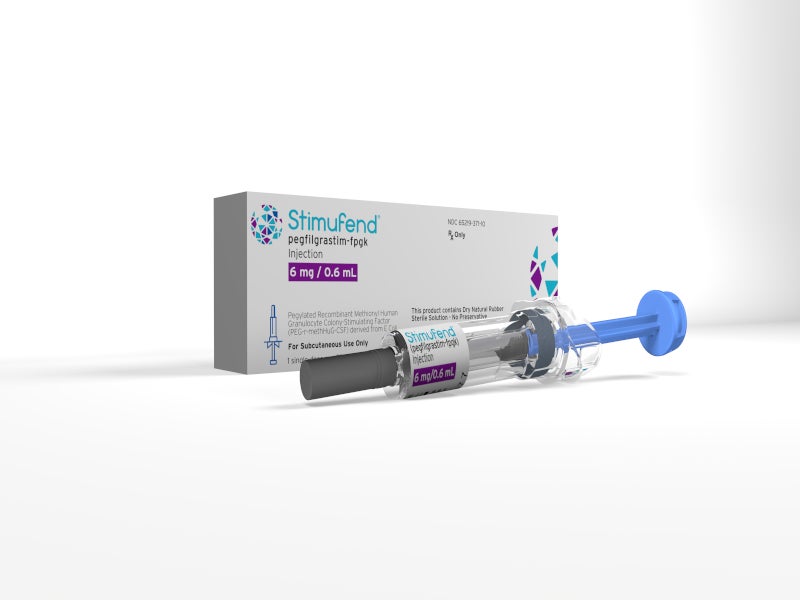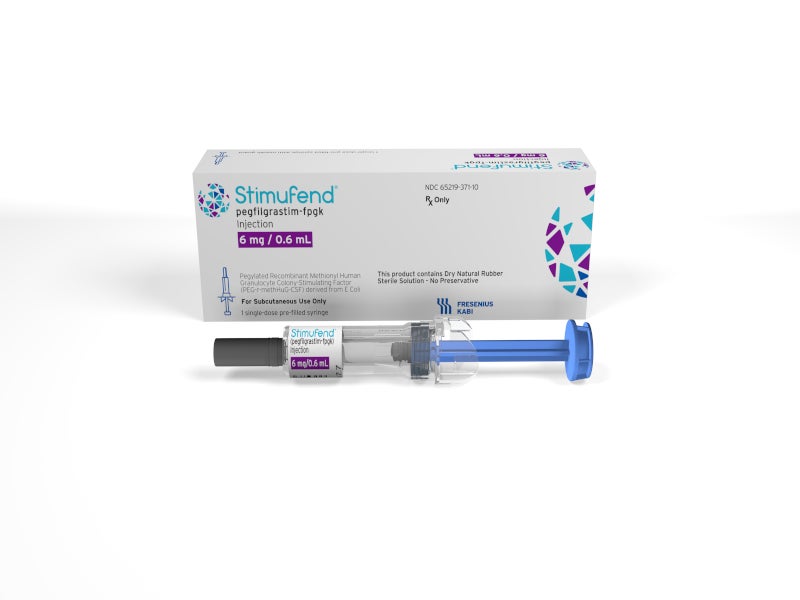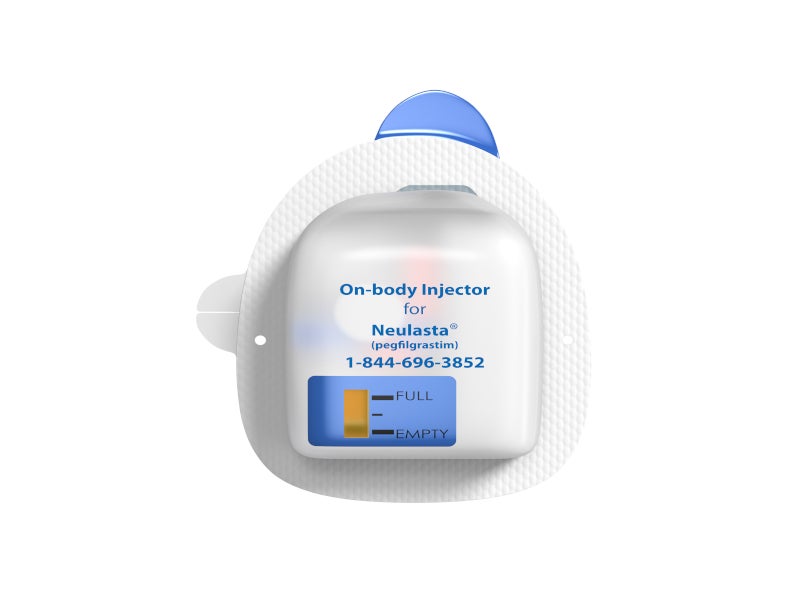Stimufend® (pegfilgrastim-fpgk), developed by German pharmaceutical company Fresenius Kabi, is a biosimilar to the company’s Neulasta® (pegfilgrastim). It is indicated for use in patients with non-myeloid malignancies receiving myelosuppressive anti-cancer medications associated with a clinically significant incidence of febrile neutropenia.
Characterised by lower counts of neutrophils in the blood, febrile neutropenia is a common side effect of several anti-cancer drugs. Patients at risk are eligible for Stimufend.
The drug provides an economical, high-quality therapeutic alternative for cancer patients following chemotherapy to reduce the occurrence of febrile neutropenia.
Stimufend is a clear, colourless, preservative-free solution available as a single dose of 6mg/0.6ml in prefilled injection for subcutaneous administration.
Regulatory approvals for Stimufend
The European Medicines Agency’s Committee for Medicinal Products for Human Use recommended Stimufend to reduce the duration of neutropenia and the incidence of febrile neutropenia following cytotoxic chemotherapy in January 2022.
In March 2022, the European Commission (EC) granted marketing authorisation for Stimufend (pegfilgrastim-fpgk) for all approved indications of the reference drug Neulasta. The drug became the company’s first biosimilar to be used in oncology.
The US Food and Drug Administration (FDA) approved Stimufend for use in patients with non-myeloid malignancies receiving myelosuppressive anti-cancer drugs associated with febrile neutropenia in September 2022. The drug was made available in the US in February 2023, becoming the company’s first biosimilar available in the US.
Neutropenia causes and symptoms
Neutrophils are white blood cells that help the body fight against infections.
Neutropenia is a condition in which the bone marrow does not produce enough neutrophils, or they break down too quickly or are eliminated. Abnormally lower levels of neutrophils increase the risk of infection.
Symptoms of neutropenia include fever (febrile neutropenia), fatigue, sore throat, swollen lymph nodes, ulcers, pain, swelling and rash at an infection site, diarrhoea and burning with urination. Repeated infections may also be a sign of neutropenia.
Neutropenia is a common condition among cancer patients undergoing chemotherapy. It is caused by genetic abnormalities, infections, tumours, medications, nutritional deficiencies, autoimmune deficiency and chronic idiopathic neutropenia.
Stimufend’s mechanism of action
Stimufend is a leukocyte growth factor with pegfilgrastim-fpgk as an active substance. It is a long-acting form of filgrastim, a recombinant human granulocyte colony-stimulating factor, which serves to stimulate the production of neutrophils by binding to specific cell surface receptors on hematopoietic cells.
It stimulates the bone marrow to create more white blood cells, raising its levels and treating neutropenia.
Clinical trials on Stimufend
The FDA approval of Stimufend is based on a review of a comprehensive set of data and all available evidence that strongly supported its biosimilarity with Neulasta.
The drug was evaluated in three randomised, double-blind, controlled clinical trials.
Trials Ⅰ and Ⅱ were active-controlled trials in which doxorubicin 60mg/m2 and docetaxel 75mg/m2 were administered every 21 days for up to four cycles for the treatment of metastatic breast cancer. Trial I evaluated the use of a fixed dose of pegfilgrastim, while Trial II employed a weight-adjusted dose.
A total of 157 patients in trial I and 310 patients in trial Ⅱ were randomised to receive a single subcutaneous injection of 6mg pegfilgrastim in trial I and 100mcg/kg pegfilgrastim in trial II, on day 2 or daily subcutaneous filgrastim beginning on day 2 of each chemotherapy cycle.
In both trials, duration of severe neutropenia was the primary endpoint and the efficacy of pegfilgrastim was demonstrated by establishing comparability to filgrastim-treated patients in the mean days of severe neutropenia.
The mean days of cycle 1 severe neutropenia in trial I were 1.8 days in the pegfilgrastim arm, compared to 1.6 days in the filgrastim arm. In trial II, the mean days of cycle 1 severe neutropenia were 1.7 days in the pegfilgrastim arm, compared to 1.6 days in the filgrastim arm.
Both studies successfully achieved the primary efficacy outcome by showing that the average duration of severe neutropenia in patients treated with pegfilgrastim did not exceed that of patients treated with filgrastim by more than one day during the first cycle of chemotherapy.
The trial Ⅲ was a randomised, double-blind, placebo-controlled trial that employed docetaxel 100mg/m2 every 21 days for up to four cycles in patients with breast cancer or non-metastatic breast cancer patients receiving docetaxel/cyclophosphamide chemotherapy.
A total of 928 patients were randomised to receive either a single subcutaneous injection of 6mg pegfilgrastim or placebo on day 2 of each chemotherapy cycle.
The primary endpoint of the study was the incidence of febrile neutropenia. The trial Ⅲ showed that the incidence of febrile neutropenia was lower (1%) for pegfilgrastim-treated patients compared to placebo-treated patients (17%).
Hospitalisations and intravenous anti-infective use in febrile neutropenia treatment were also lower in the pegfilgrastim-treated patients compared to the placebo-treated patients.
Bone pain and pain in extremities were the most common adverse reactions reported in patients during the trials.





